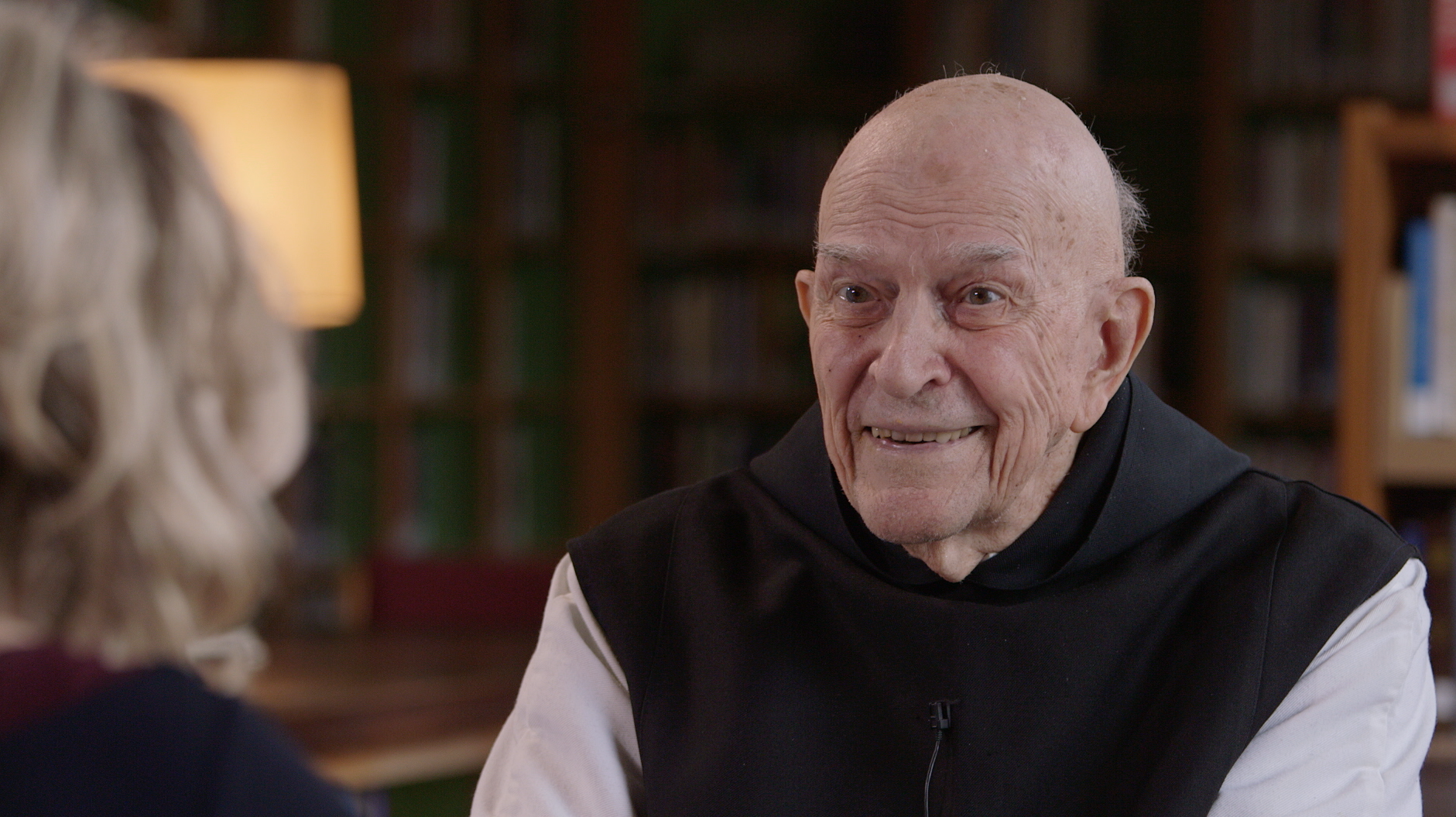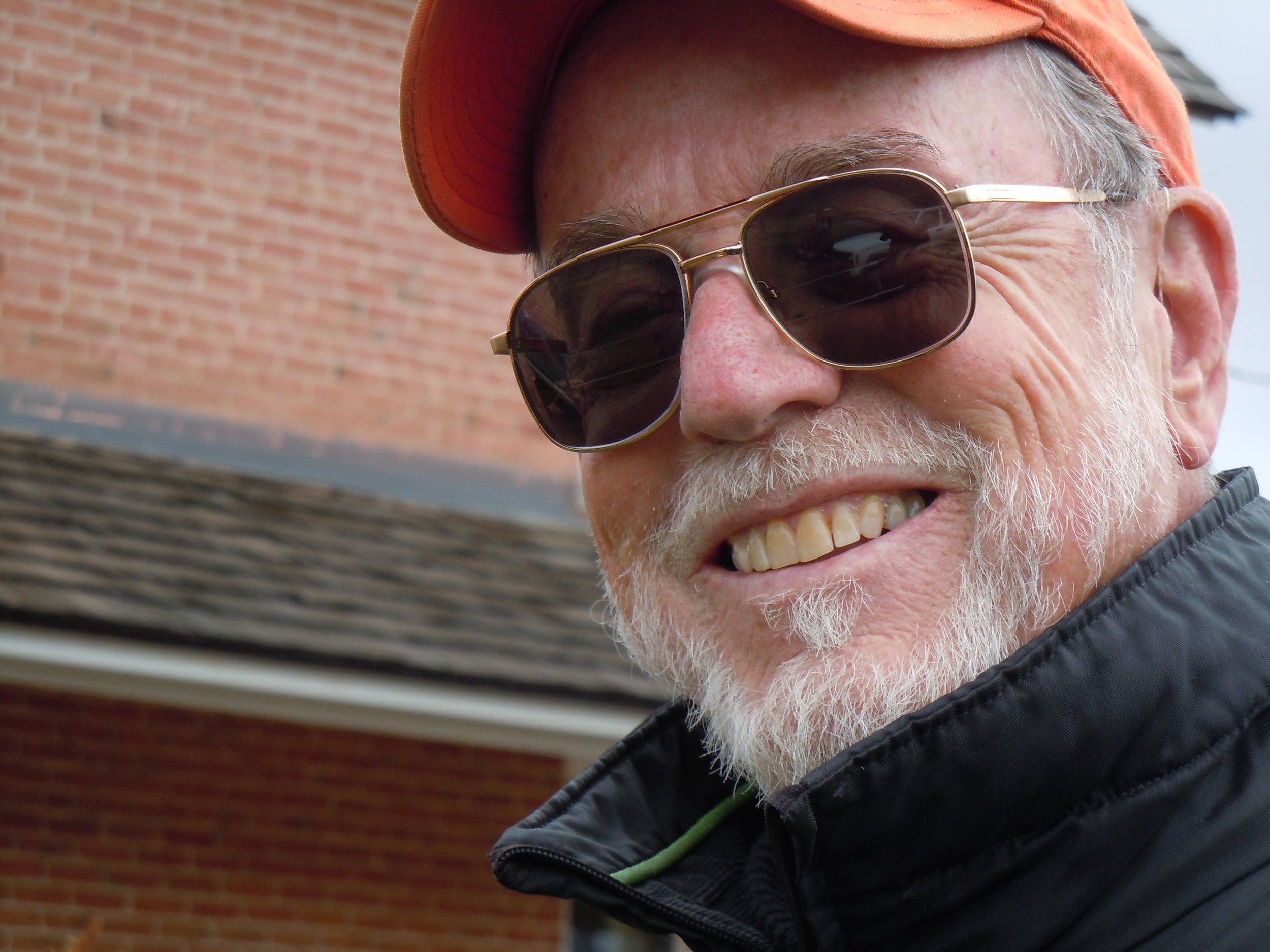Interviews
searching for truth in dialogue

When I was given a camera team and asked to find 'people that matter', we travelled world wide, working ceaselessly to capture their words on camera. The television series 'Estafette' rang a bell and texts were written down in 'Pelgim in het leven' en 'Ongewone Wegen'.
Afterwards, a Rhineland abbess, Hildegard von Bingen, crossed my path. Although we were nine centuries apart, her powerful words struck me. We traced back her steps and made a film about her in the Eberbach Abbey, a just beautiful experience.
Time for a pause in this hectic life. I read books, practised zen, wrote down ideas and got married to Gerard Bodifee, a remarkable man. Together we founded Huis voor Filosofie.
The pause didn't last long. In Holland, the programme 'De Wandeling' was waiting for me. For three years, I trod the countryside, from Amsterdam to Maastricht and discovered high roads and country roads, meeting remarkable people.
Coming back to Belgium, I could go 'into the deep'. Everything I had learned upto now, everything I had experienced could resonate with new guests in Worldviews. With my new book 'World Without End', the story is continuing.... in other formats, new ideas, new projects.
Books
words that won't let go

WORLD WITHOUT END
INTERVIEWS WITH FATHER KEATING AND ABBOT BOYLE IN ENCHANTING COLORADO
This amazing book has got a story to tell....
For a very long time, I had wanted to interview a special guest. And now, the time had finally come. Father Thomas Keating, who is living as a Trappist monk in Snowmass is known throughout the world as a teacher and a writer on contemplative prayer. But what is prayer, and what is 'contemplative prayer'? I gathered a camera crew and flew to his home in the Colorado Rockies. What an experience to meet him, the monks of St. Benedict's and abbot Joseph Boyle.
FATHER JOSEPH BOYLE
ABBOT
As a Cistercian abbot, father Joseph Boyle is a source of inspiration to his community. He is an all-round person, enjoying himself driving the tractor and working on the farm. This remarkable man is the incarnation of the contemplative philosophy, taught by father Thomas Keating. I interviewed him in Colorado in May 2015 and captured his words in my book ‘World Without End’ and we kept in contact until he died on 21st October 2018. I am currently preparing a new series on my Youtubechannel ‘Wise Words’ in which his wise words will be prominent. In his humble but deeply authentic way, he was indeed a source of inspiration. I’ll miss him dearly and cherish the moments we shared when making the film but also when the cameras were not rolling and he was pointing at the stars, Deneb of the Swan, being his favourite.
FATHER THOMAS KEATING
SPIRITUAL LEADER
This Trappist monk is known throughout the world as an exponent, teacher and writer on contemplative prayer. He is living in St. Benedict's Monastery, Snowmass, Colorado and authored numerous books, guiding and helping people on their journey. I interviewed him in Colorado in May 2015 and we were in contact over the book that we worked at together : ‘World Without End’ that captured the words of his interview. He died on 25th October 2018 in Spencer, Mass. and will be buried on 16th November in Colorado. A great teacher to be missed. Thank you, Father Thomas for your invaluable help and advice! Once more, his words will be captured in the new series ‘Wise Words’, of which the first one is dedicated to him, speaking about his life and pointing to our capacity for infinite happiness. You’ll be missed dearly. This series is an homage to you.
Surrounded by the Rocky Mountains in Colorado and realizing what really matters....
THE DOMINICAN WAY Review
The Dominican Way, Ed. Lucette Verboven, with Introduction by Timothy Radcliffe, OP
London and New York: Continuum, 2011.
“We are a big family, used to welcoming different people. Some are very traditional, some are a bit crazy!” So responds Jean-Jacques Pérennès, OP, of the Dominican Institute of Oriental Studies in Cairo, in an interview with Lucette Verboven. This interview, along with those of sixteen other Dominicans, can be found in her anthology: The Dominican Way. Among these 17 family members are friars, monastic women, sisters, and laity; with ministries in Europe (UK, Ireland, Italy, Norway, Belgium, France, Belarus); Africa (Benin, Nigeria), Middle East (Iraq, Egypt), Asia (Japan), North and South America (USA, Brazil). The two people most responsible for this remarkable collection of interviews are Verboven, a Flemish writer and film producer, and Timothy Radcliffe, Master of the Order of Preachers from 1992 to 2001. It was largely because of Verboven’s initial interview of Fr. Timothy in 1997 (there are two others in the book) that the author was drawn to examine “the Dominican Way” over a period of years, and in the process encounter these nine men and eight women whose lives and ministries reveal the present vitality of an Order celebrating 800 years of history.
Every significant aspect of the charism of the Order can be found in this collection: two young nuns (names withheld for their protection) speak eloquently for the monastic and contemplative life as they describe a hidden novitiate and period of formation in Eastern Europe while they wait to establish a foundation in Belarus. Breda Carroll, Prioress of a monastic community in Ireland, speaks of her love of liturgy, adoration and community life as she affirms the strong bond of relationship between friars and nuns from the beginning of the Order. And Japanese friar Vincent Oshida weds the Christian and Buddhist traditions in the community he founded in Japan, rooted in poverty and meditation.
Korean artist Kim En Joong and Scottish composer James MacMillan find inspiration for their painting and music in the vibrant prayer and liturgy of the Dominican tradition. MacMillan, with his wife a member of the Dominican laity in Glasgow, was recently commissioned to compose the Mass celebrated by Pope Benedict XVI for the beatification of Cardinal Newman.
Witnessing to the central role of study in the charism of the Order of Preachers are the interviews with Katarina Pajchel, a Dominican sisters and physicist, working in particle physics at CERN, the prestigious European organization for nuclear research in Switzerland; and Helen Alford, Dean of the Faculty of Social Sciences at the Order’s Pontifical University, the Angelicum, in Rome—the first woman to hold that position. It was on the foundation of his studies in the US that Nigerian friar Godfrey Nzamujo could return to Africa where he utilized his expertise in engineering to establish an ecological agri-business center in Benin.
Perhaps most eloquently represented are the various ministries of justice, dialogue and peace-building reflected in the interviews with those whose lives have truly been at risk as they preach the peace of Christ in situations of conflict: Prioresses Maria Hanna (Iraq) and Faustina Jimoh (Nigeria) whose communities have endured constant danger and political oppression; Jean-Jacques Pérennès, Vicar Provincial of Dominicans in Arab countries, and his colleague Emilio Platti, whose passion is Christian-Muslim dialogue; and Henri Burin des Roziers, a Dominican lawyer who worked with Sister Dorothy Stang in Brazil defending the rights of the landless peasants in the Amazon forests, and lives with a bounty on his head.
Three of those interviewed in this collection have perhaps contributed most to the cohesiveness of the several branches of the Dominican Family: the friars, the nuns, the congregations of active sisters, and the Dominican laity. They are Fr. Timothy, Master of the Order for nine years (1992-2001), Sr. Margaret Ormond, whom he delegated to initiate the first world-wide office for Dominican Sisters--Dominican Sisters International--in 1998; and Fr. Brian Pierce, former missionary to Latin America who is the Order’s Vicar for contemplative, cloistered nuns throughout the world.
In the Prologue of the earliest text of the Constitutions of the Order of Preachers (1228) we find this statement: “ . . .it is known that our Order was founded, from the beginning, especially for preaching and the salvation of souls. Our study ought to tend principally, ardently, and with the highest endeavor to the end that we might be useful to the souls of our neighbors.” Reading this collection of first-hand accounts of contemporary preaching, there is no doubt that the Founder’s dream, a form of simple but profound pragmatism, is fulfilled in the lives of these members of the Dominican Family.
Ruth Caspar, OP
Dominican Sisters of Peace









